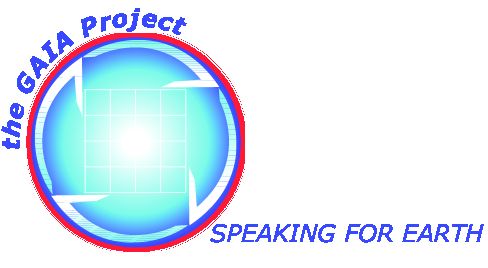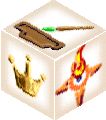Gaia Project

Creating Speakers for the Earth
I conceived the Gaia Project in 1986. It is based on the Gaia Hypothesis of James Lovelock and Lynn Margulis. This hypothesis looks at Earth, itself, as a life form - a planet which had been transformed by a self-evolving and self-regulating process into a living system.
This, of course, is a radically different way to look at things than the commonly accepted in western culture and has sparked controversy in certain scientific circles. It is my viewpoint that correct, or semi-correct - or not - that the hypothesis is extremely useful.
The Gaia Project is conceived to take on four tasks and four tasks only. First, to promote credible scientific work that investigates the hypothesis. Secondly, to train individuals to become SPEAKERS for Gaia. Third, to encourage human governance organizations: governments at all levels, corporate boards, non-profits and educational institutions and networks, to accept Speakers for Gaia as full voting members of their governance bodies. Fourth, to act as a project management information and integration system for Gaia project members who step up to conduct projects that accomplish aspects of one or more of the first three tasks.
The basic notion is this: if the earth is in fact a self-regulating system it does not need to be protected, it needs to be involved in human affairs and visa versa. The either/or propensity in our human thinking tends to divide us into two warring camps composing the ecological/economic arena. Each claims dominance. One camp wants Nature first, the other Humans first. One argues ecological principles, the other economic. These arguments start with a dichotomy and end in a contradiction. Both ecology and economics are the same discipline. Neither can dominate. Both have to evolve together. Both, in fact, are measuring the same thing only at different scales. When the disciples of each become integrated in the other, we will have taken a first, but significant, step towards being able to conceive of an Earth habitat and work in harmony to co-evolve one.
If the Gaia Hypothesis is not true, in the strict scientific sense, the concept nevertheless serves well as a human fiction that can create a powerful voice for balance.
The essence of self-managing systems is feedback. When things get out of wack it is because the in-place feedback loops are inadequate. This is what we have today in our human-based economic systems. The market is a great self-regulating system - the problem is that the market does not “see” and respond to much of what it is now directly impacting. The solution is not to attack the market principle, it is to expand the concept of market and the scope of what is being measured. It is to educate humans about cybernetic and complexity theory and to increase the variety of human institutions to match the functional complexity of the environment they exist in - and impact.
The ecological-economic divide is both a philosophical dichotomy and a classic example of the requsite variety problem (Ashby, Beer).
Placing Speakers for Gaia on governance boards is a simple way to bring the Earth’s voice directly into human affairs. It is the fastest way to build new feedback loops that will provide a higher level of stability.
To do this, of course, means that Speakers have to developed. They have to know the science and be good, practical co-designers. They cannot be rigid ideologues. They have to know that Gaia can and will respond. They have to represent this viewpoint and scale (time and size) objectively.
The tradition of SPEAKER is an old one in human history. It is related to the “Fair-Witness” concept, the shaman, the philosopher and the academic in their noblest sense. In our so-called modern culture these practices are compromised. Jane Jacobs talks about this in Systems of Morality. This is one reason why we are in so much trouble. Experts contradicting other experts - hired intellectual guns in the spin game - is the norm so that a few days after an event it is impossible to know even what happened let alone what to do. This has become our sad heritage. The House of Intellect that Barzon wrote about - is gone.
The Gaia project will have to reestablish the practice of intellectual stewardship and educate a generation of Speakers who will take on the important task of representing the system-as-a-whole with fairness and power and total integrity.
However... Speakers cannot speak if they do not know what it is they represent. This is why the science is important. The more we know about the self-regulating processes of the Earth, the more we know about what is critical and not, the better this knowledge can be represented as an integral part of the design and decision process of human societies.
As to the “truth” of the hypothesis, two comments: in the old tradition, when an indigenous human explained to a tree the need and use before harvesting, it can be questioned to what degree the tree understood it all - however, the attitude is a much better one than the bulldozers of our modern logging and construction industries. Also, by establishing truly effective Speakers and getting them placed in organizations at significant scale, a “living” voice for Earth is created. I will leave it to the philosophers to argue the reality if this brings Gaia awake, in the human sense, or not.
Scientists have to worry about what is real, designers are concerned about what they can make real.
The Gaia Project will be managed by iterations. It will be a fee-based membership organization. The fees will be used to both promote and fund projects and to provide meta-project management for the projects submitted and supported by members. There will be a selection process with Speaker participating to determine what is funded and how the project management process is conducted. Clearly, this will be a rule-based, distributed, emergent organization/process.
The design-intention is to keep projects small, short term and specific. It is the architecture of the projects, as a sum, that must add up to the accomplishment of the four tasks.
As example, a project can be to define what a Speaker is (at any moment). Another to train a fixed number of Speakers. Another to design what Speaker will wear (Trade Dress) in their role as Speaker. Another to get a number of them onto a specific corporate board.
Other projects can be to support specific research efforts at an University or by an individual that will help “prove,” “disprove” or evolve the hypothesis. There can be projects aimed at educating the public to the hypothesis and the notion of self-regulation and Speaker-hood.
And so on...
The basic thrust is that the Gaia Project is not a debating society or a club. It is a working organization with a clear mission to accomplish - at global scale - the four tasks outlined above. In this disciple is it’s utility.
The Gaia Project is essential to the proper execution of the Master Planning Process and the Earth as a Garden and Work of Art projects.
Of course, I am aware that the basic premise of this project will not be popular in many circles. It does not fit in a single camp. This, however, is the part of the point. The Gaia Project re-frames the debate. And, beyond that, it pre-empts the debate. This is the essence of the design approach. Make something and test it. It will work - or not. Fix and test it again through many iterations of Design, Build, Use.
Since WWII, humanity has been - at a steadily accelerating rate - building political/economic systems characterized by increasing individual freedom and prosperity. While an improvement on one level of recursion, this is causing great distress on the level we call Nature. It is all nature, of course, and our separating ourselves from nature is part of the problem. While feedback is sometimes understood and applied within a single level of recursion, it is almost never emplyed between levels of recursion. This is why PatchWorks Designs methods have to be emplyed when dealing with complex projects.
Matt Taylor
The Lost Whale Inn
January 1, 2001

SolutionBox voice of this document:
INTENT • POLICY • PROGRAM
Posted: January 3, 2001
Revised: January 31, 2001
• 20010106.662353.mt • 20010131.542181.mt •
Copyright© Matt Taylor, 1986, 2001